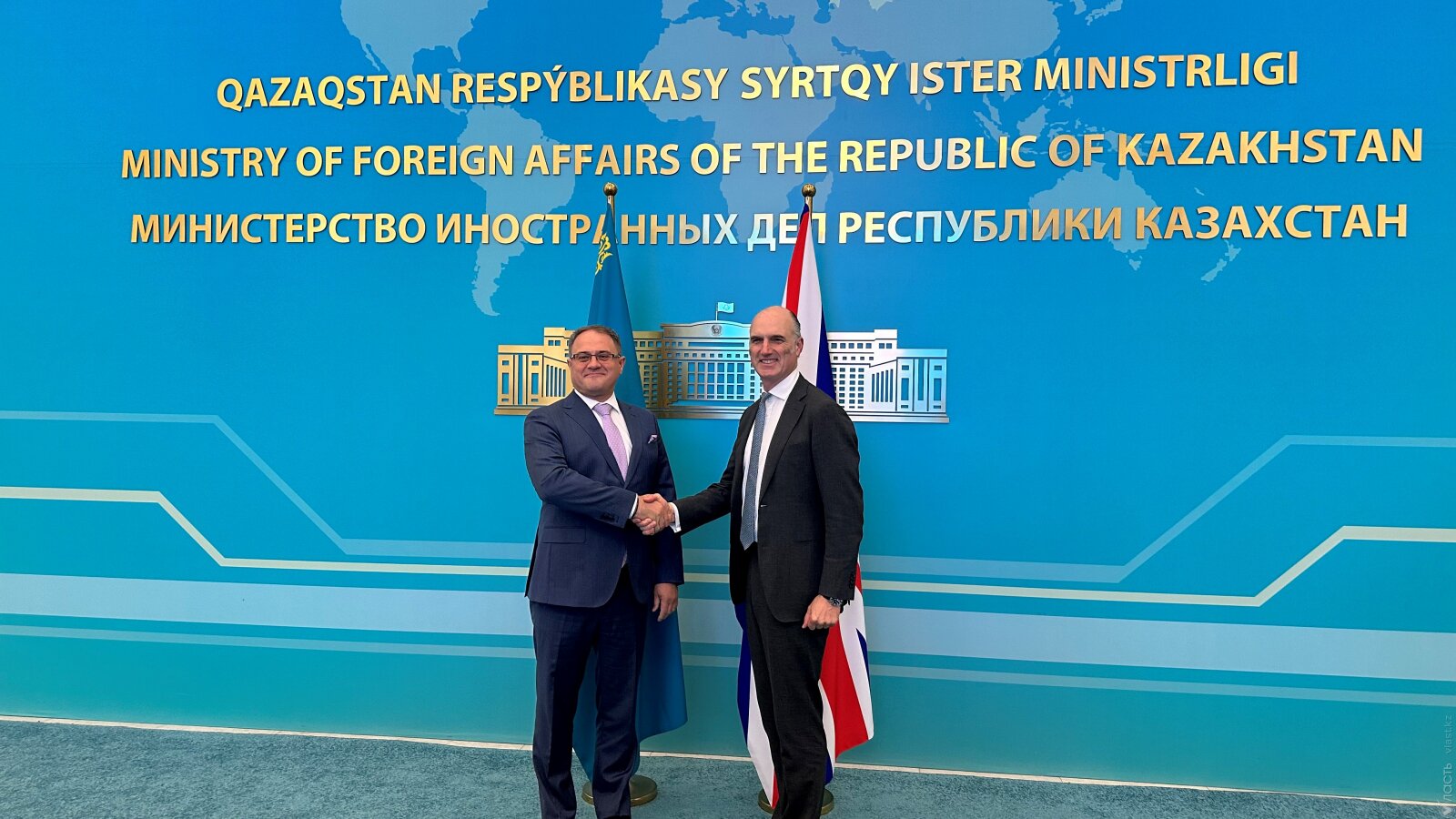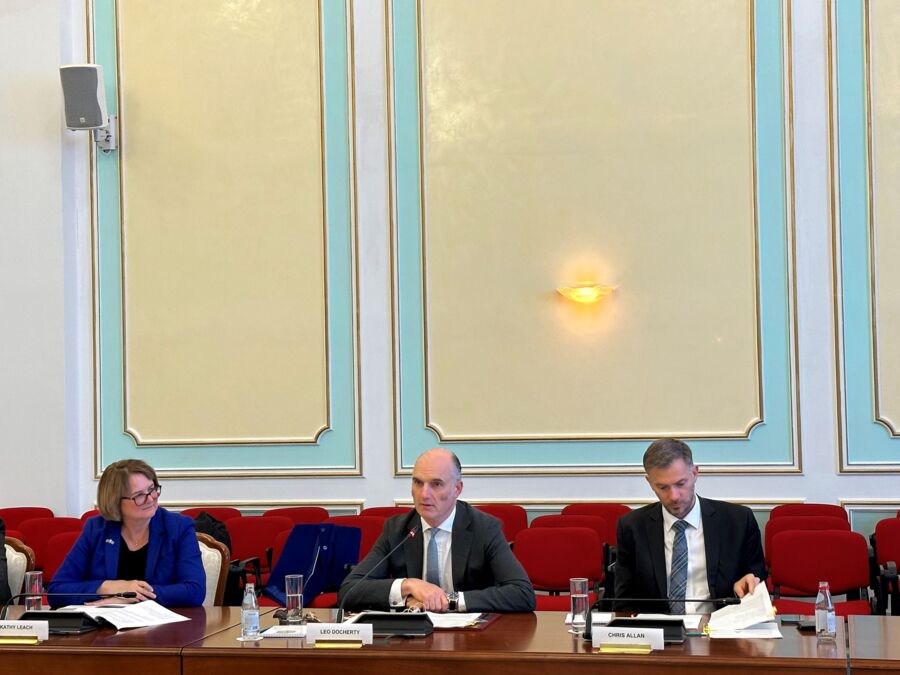- ВКонтакте
- РћРТвЂВВВВВВВВнокласснРСвЂВВВВВВВВРєРСвЂВВВВВВВВ
On October 2, UK Minister for Europe Leo Docherty visited Astana within the framework of the UK-Kazakhstan Strategic Dialogue. He was met by deputy foreign minister Roman Vassilenko and attended a range of meetings with officials and local NGOs.
Mr Docherty, during your visit to Astana, what did your conversations with local officials focus on?
We discussed a range of issues, including our bilateral strategic partnership, global issues like climate change, and the impact of Russia’s illegal invasion of Ukraine. Now that the UK has left the European Union, we have been negotiating a Strategic Partnership and Cooperation Agreement (SPCA) as the new foundation for our bilateral relationship. We hope to sign it shortly.
The Agreement sets out the framework for a broad strategic partnership, political dialogue, and close cooperation across a wide range of areas, including foreign policy, security, economy, trade and investment, energy and climate change, education, justice, and human rights.
Who else did you meet during this visit?
During my short visit, I met with NGOs focused on building a strong independent media, and with businesses seeking to invest, including in opportunities such as the ‘Middle Corridor’.
People in business, civil society, and other sectors, including brilliant alumni from British universities, will play a key role in building a fair and prosperous Kazakhstan during the next 30 years. I’m keen to hear their views on how to grow the UK-Kazakhstan strategic partnership, reinforcing some of the key pillars of our relationship over the past 31 years, including business, education, and security cooperation in areas like peacekeeping.
Within the framework of the UK-Kazakhstan Strategic Dialogue, what initiatives did you focus on concretely, especially for what concerns the efforts to counter climate change and to foster peace and stop Russia's war in Ukraine?
We know the huge economic cost that Russia’s war on Ukraine is inflicting on countries around the world, including Kazakhstan, as prices spike and supply chains are disrupted. I am grateful for Kazakhstan’s consistent and principled position in supporting Ukraine’s territorial integrity, and a resolution to the war in line with the principles of the UN Charter. The UK, together with other partners, is determined to give Ukraine the support it needs, for as long as it takes, to defend its sovereignty and territorial integrity and end this war.
On the fight against climate change, I think the UK has a lot of expertise to offer Kazakhstan to help achieve its Net Zero target by 2060. The UK underwent its own transition from coal. In 15 years we’ve reduced the percentage of coal used to generate electricity from 40% to less than 5%. We’ve grown renewables from less than 5% of electricity generation in 2008 to over 40% now, coming from a mix of wind, solar, bioenergy and hydroelectric energy. We are at the cutting edge of new technologies like hydrogen, and we’ve also shown that energy efficiency is the cheapest investment you can make to reduce emissions.
We want to help Kazakhstan fulfill its green potential, and we’ve been encouraged by its substantial investments in renewable energy sources, its interest in signing up to the Global Methane Pledge, as well as its dedicated efforts in reforestation and afforestation. So called ‘nature based solutions’ are vital elements to help protect water resources and ecosystems.
With regards to the war in Ukraine and the relative sanctions against Russia, what is Britain focusing on when observing the circumvention of sanctions among Central Asian countries, including Kazakhstan? Is Kazakhstan at risk of being sanctioned in case these sanction-busting schemes continue?
Sanctions are a crucial part of our strategy to pressure President Putin to stop his illegal war and to ensure that our technology is not used to kill civilians. Kazakhstan has continued to make clear it will respect sanctions and will not be a back door to sanctions circumvention. I am grateful for the open dialogue we have on this issue. Working in good faith and partnership, we will continue to do everything we can to minimize the economic impact of Russia’s war on Ukraine on Kazakhstan.
British companies have invested in Kazakhstan for decades. How do you see the next few years for the UK private sector in Kazakhstan, given galloping inflation, high interest rates, and a growing poverty rate among the population?
UK companies, institutions, and expertise have played a defining role in supporting Kazakhstan to build key strategic sectors like education, aviation, finance, and law. Although Kazakhstan faces some tough economic challenges, we continue to see a lot of confidence among British companies working in Kazakhstan. To take a few examples, in sectors like critical minerals and mining we have major and junior mining companies actively looking for new discoveries, as well as brilliant companies in the supply chain offering technical solutions in building safe, sustainable mining operations.
During my visit, AstraZeneca signed an agreement with the Ministry of Health to localize production of some of its top branded pharmaceuticals to sell throughout Central Asia. There is a lot to feel encouraged about, provided the government keeps its focus on continually improving the business environment, listening to business, and making sure things like tax policy are in line with best international practice.
Through recent reforms, especially for what concerns the legislation on the return of illegally-withdrawn assets (similar to the unexplained wealth order in the UK), the government of Kazakhstan seems to intend to tackle corruption and kleptocracy. These measures seem in line with Dame Hodge's argument from almost two years ago. Do you consult with the government and approve of the latest developments in this regard?
Illicit financial flows have a substantial and crippling effect on societies and economies. We support President Kassym-Jomart Tokayev's proposals to tackle illicit finance and are working with our Kazakhstani counterparts on matters relating to illicit finance and asset recovery. The UK has considerably strengthened its own legislative tools in recent years to help tackle corruption, including the Sanctions and Anti-Money Laundering Act of 2018 which provides for the imposition of financial sanctions in order to prevent or combat serious corruption.
In Kazakhstan, we hope that the successful example of the Astana International Financial Centre, with its international court and arbitration centre, is providing a whole new generation of Kazakhstani lawyers with essential experience in best international practice in commercial law. It has been a great success, with over 2,000 cases completed and enforced since January 2018, with a total value of almost $700m. In criminal law, we, like many partners here, have over the years invested in training judges, and preparing for jury trials. But of course the other essential element in combating corruption in any society is fearless, fact-based investigative journalism.
A British commission traveled to Almaty and harshly criticized the due process in the trial of Zhanbolat Mamai, a political activist that served several months in prison. How do you consider the state of human rights in Kazakhstan? During his visit in March, Foreign Secretary James Cleverley highlighted the need to improve media freedom and human rights. How do you think cooperation in this regard has progressed?
Over the past 18 months we have welcomed President Tokayev’s commitment to a ‘new’ fair and just Kazakhstan, with political reform and action to strengthen human rights protections, including for example by giving an enhanced constitutional status and increased funding to the Human Rights Ombudsman, and establishing a Constitutional Court.
In particular, Kazakhstan’s NGOs rightly continue to press on the importance of a transparent investigation and public account of what happened in January 2022 and how at least 238 people, including 19 law enforcement officers, lost their lives.
As the UN Human Rights Commissioner said during his visit in April 2023, the challenge is to make sure ‘that the pledges to act on human rights are translated into action on the ground’. Again, I highlight the importance of a professional, independent media sector, in every country including in the UK and Kazakhstan, to honestly expose problems, hold the government to account, and thereby build more effective, responsible institutions. I know there is an ongoing debate over the new draft law On mass media in Kazakhstan and how best to support the independence of the media – it is a good sign that there is a lively and active debate on this vital issue.
Поддержите журналистику, которой доверяют.









